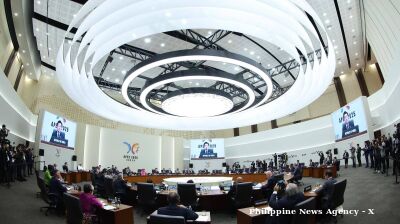‘Putin’s Davos’ recovers to pre-war levels, but representation from the West has all but disappeared

Russian President Vladimir Putin’s flagship St. Petersburg International Economic Forum (SPIEF) has recovered from the downturn from Covid-19 and Moscow’s full-scale invasion of Ukraine, but participation by Western countries has all but disappeared.
Prior to 2022, SPIEF was a must-visit event for all international investors in Russia, and regularly hosted notable world leaders, including President of France Emmanuel Macron, then-Italian Prime Minister Matteo Renzi and former Federal Chancellor of Germany Angela Merkel, and long-time Finnish President Sauli Niinistö. The Forum also hosted important international executives, such as the heads of multinational oil companies, and journalists from across the globe.
SPIEF in 2024 looks very different.
Following Putin’s decision to launch a full-scale invasion of Ukraine, the event has almost been completely abandoned by Russia’s former Western partners. The majority of Western companies have shunned the event, while multinational oil and gas heavyweights – once staples of the forum – have opted not to send their executives.
In place of Western leaders, this year’s event will be attended by Zimbabwe’s President Emmerson Mnangagwa, Bolivian President Luis Arce, President Milorad Dodik of Republika Srpska, and Prime Minister of the Central African Republic Felix Moloua. Other countries have sent high-ranking ministers, such as Abdulaziz bin Salman Al Saud, Minister of Energy of Saudi Arabia, and Abdullah Bin Touq Al Marri, the Minister of Economy of the United Arab Emirates.
The one EU minister scheduled to take part is Peter Szijjarto, Minister of Foreign Affairs and Trade of Hungary.
This year’s event is based on the theme of “Transition to a Multipolar World Economy,” with a particular focus on cooperation between Russia and its allies in the Eurasian Economic Union (EEU), the Shanghai Cooperation Organisation and BRICS. Topics covered will range from dedollarisation and new trade routes to technological sovereignty and artificial intelligence.
The forum will also play host specific stands promoting investment in Russian regions, including those located in Ukraine, illegally annexed by Moscow in 2022. Both the Donetsk People’s Republic and Lugansk People’s Republic have their own booths.
As is customary, the event will culminate in a plenary session on June 7 attended by President Vladimir Putin. Like in previous years, Putin will likely be joined by other world leaders, either physically or virtually. In 2023, the guest was Algerian President Abdelmadjid Tebboune.
Despite the lack of western representation, Russian presidential advisor Anton Kobyakov has boasted that more than 17,000 people and 3,400 media representatives from 136 countries and territories will visit the event, meaning it has reached pre-war and pre-Covid levels.
“SPIEF is currently acting as one of the sovereign centres of global development, fulfilling a historically unique mission to maintain the global balance of power and build a multipolar international system, creating conditions for development based on a unifying and constructive agenda dictated by Russia's national interests,” he said.
“Today we can confidently say that the period of restoration of business activity is over and we are in a growth phase. The 2019 figures have been surpassed, which suggests that the forum is in demand by the global business community as a communication tool and that interest in it continues to grow.”
News

US–China soybean sales restart
According to Scott Bessent, US Treasury Secretary, the agreement marks a significant step towards restoring normalcy for American farmers.

Russia faces $50bn annual losses from oil sanctions as Lukoil exits international assets
Russia is expected to lose at least $50bn annually due to oil-related sanctions, as Moscow’s largest private oil producer Lukoil agrees to sell its international assets and Germany considers nationalising operations owned by state-run Rosneft.

Chicken and chips in Seoul - for Nvidia, Samsung and Hyundai
In a low-key fried chicken shop in southern Seoul, the leaders of Nvidia, Samsung Electronics and Hyundai Motor held an informal meeting on the evening of October 30.

Presidents Lee and Xi begin diplomatic chapter at APEC summit
President Lee, who is chairing the first session of the summit at the Hwabaek International Convention Centre, stood at the entrance to personally welcome participants. President Xi reached the venue at approximately 10:02.


